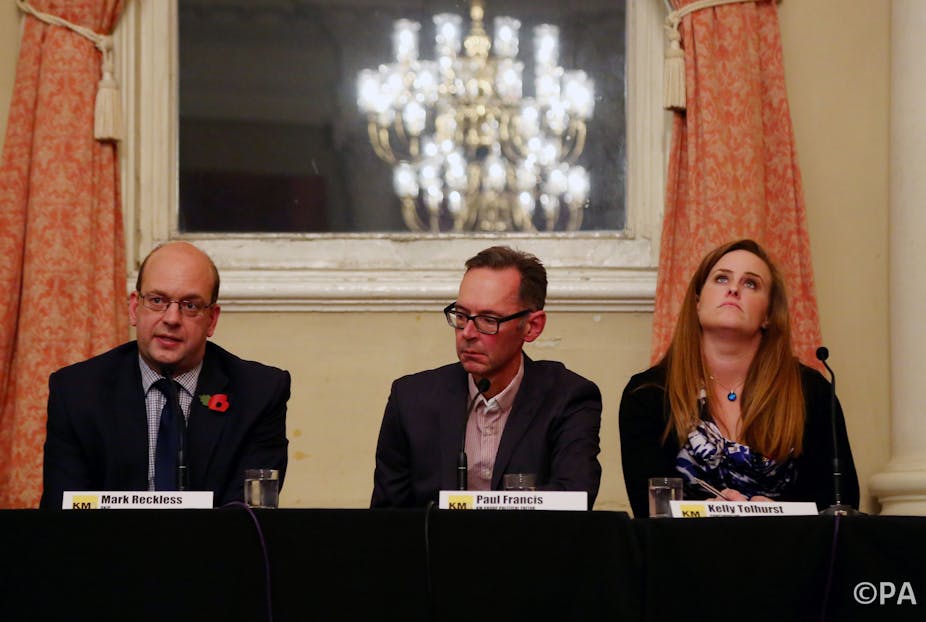You don’t want to vote for him. He grew up in London and went to Oxford, to study politics (of all things). He’s worked as a banker and as a political researcher. And he only moved here to become an MP, the swine.
This is the message being delivered to voters in Rochester and Strood on a leaflet being pushed through their doors ahead of the by-election taking place in the constituency on November 21. The leaflet is from the Conservative Party and it takes aim at Mark Reckless, the MP who defected to UKIP earlier this year.

It’s easy to mock the leaflet and plenty have. Reckless has held the seat for the Conservatives since 2010 and the party seemed to have been content to put him forward as their candidate again in 2015 had he not switched sides.
Voters may well feel confused about why Reckless is so terrible now if he was just fine and dandy as a Tory candidate. They may also be wondering why the Conservatives are criticising him for characteristics that would appear to apply to a rather large proportion of the Conservative parliamentary party. Went to Oxford, to study politics? Who can they mean?
But just because something’s cynical doesn’t mean it won’t work. There’s plenty of research showing just how good that leaflet might be at pressing voters’ buttons.
For example, the leaflet talks about Kelly Tolhurst, the Conservative candidate, having gone to the local high school but doesn’t mention any university education. Mark Reckless, we learn, went to school in Wiltshire and then on to study at Oxford. As hard as it is for those who work in education to take sometimes, voters actually prefer non-university educated candidates.
One experiment found voters preferred candidates who’d left school at 18 to those who left at 16, although even those who left school at 16 are preferred to graduates. The experiment didn’t specifically look at Oxford, but I think we can guess what that’s meant to imply. It also found that studying politics and having a background in politics – just like Reckless – made voters think of candidates as more experienced but didn’t make them more likely to want that person as their MP.
Another experiment also compared occupational backgrounds. This probably won’t come as a shock, but people running local businesses are noticeably more popular than those involved in finance. The same study, incidentally, found that otherwise identical men and women are seen as equally electable by voters, it’s just that the men are seen as more experienced, while the women are more approachable.
Keeping it close to home
The key facet of the Tory message in its Rochester leaflet is local, local, local. All six of the bullet points describing Kelly Tolhurst focus on her local links. She was born and raised in the constituency, she went to the local school and runs a business in the area. She’s been a councillor where she could be found “fighting to make our schools better” (note “our schools”, not “your schools”) and she’s even got a six-point plan to improve her community. Reckless, by contrast, is presented as a carpet-bagger, or what the French call a parachutiste.
From the outside, it’s tempting to be a bit sniffy about this sort of local appeal. It all seems a bit privet-hedge, a bit insular, a bit parochial. But there’s plenty of evidence to show it matters to voters, and more than many of the other things that commentators often bang on about.
Being local was, for example, the top of a list of demographic characteristics that voters say they want from their MP. For many voters, it is as important, or even more important than, having someone who shares their political views.
The experiments described above found that living outside the constituency (even if prepared to move if selected) was enough to generate a 15% swing against a candidate. And some work done by Jocelyn Evans, reported in a new book on British elections, found there was a significant difference when you looked at the locations of candidates in both local and general elections and their electoral success.
Looked at this way, that Conservative leaflet is perhaps more astute than it first appears. It’s almost as if someone at Conservative HQ has been reading the academic literature on this.
While the leaflet may be well pitched, it alone can’t propel Tolhurst to victory on November 21. No leaflet makes or breaks an election and in this particular case we have the added complication that Mark Reckless, as an incumbent MP, may already have a negated many of his supposed disadvantages. Even before his victory in the seat in 2010, he’d stood in its predecessor seat in 2001 and 2005. He may be a parachutiste, but he’s a parachutiste who landed safely some time ago and has now firmly dug in.
What’s more, some voters may well have the same mocking reaction as many other did on seeing that leaflet. The polls, the bookies, and most observers have Mark Reckless on course to hold his seat on Thursday for his new party. But even if the Conservatives lose, that leaflet is still smarter politics than it might seem.

